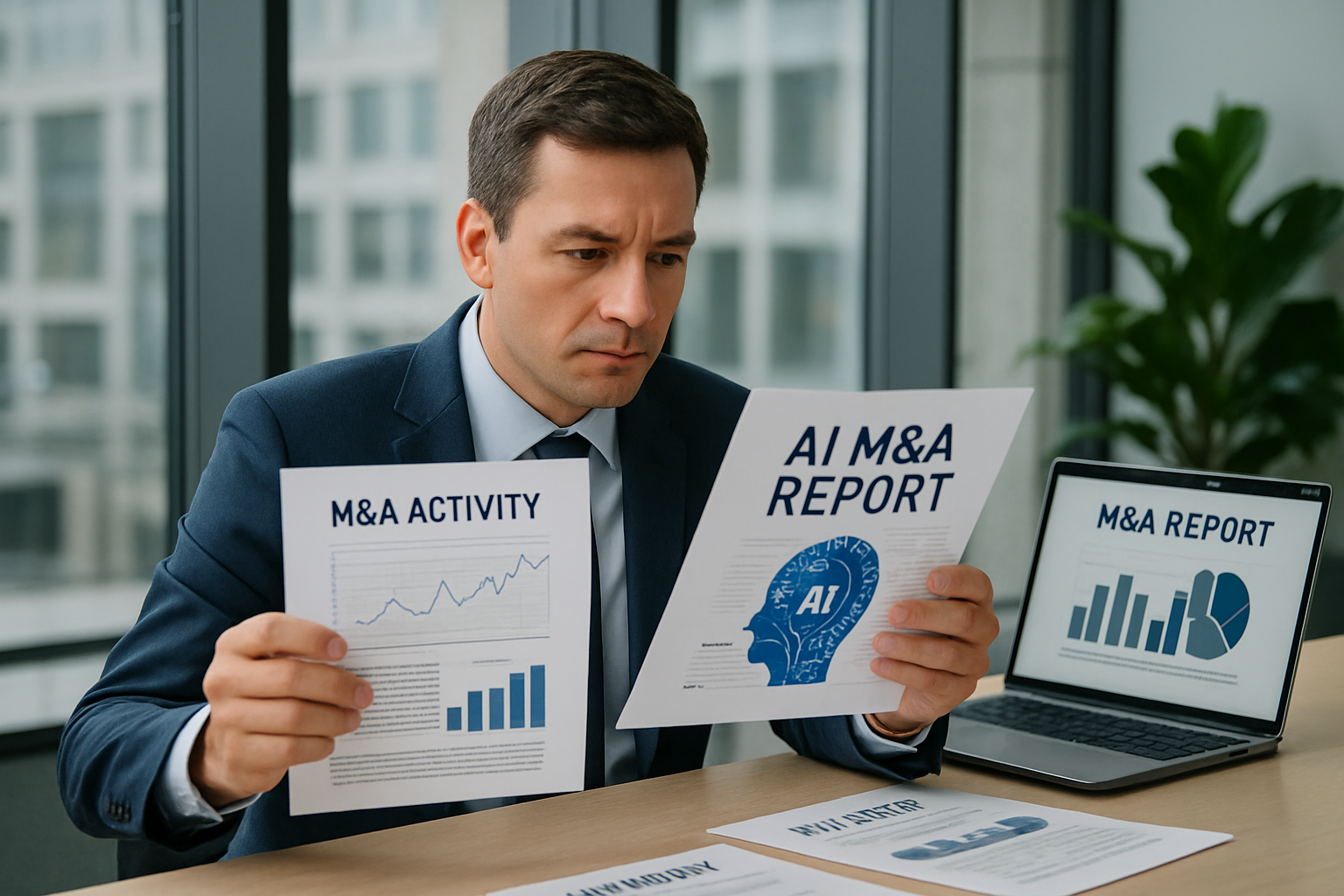QUICK TAKE
- AI deal values jumped 127% in H1 2025 despite 20% volume decline
- Private AI fundraising dropped 40% year-over-year amid market uncertainty
- 40% of CEOs fear their companies won’t survive without AI adaptation
- Legacy companies pay premium prices for AI startups and talent acquisition
A PwC survey reveals unprecedented AI M&A activity as companies race to adapt, with deal values surging 127% despite funding challenges threatening business survival.
The artificial intelligence dealmaking scene bucked broader market trends in the first half of 2025. Strategic acquisitions pushed total values up 127% even as deal volume dropped 20%. This dramatic shift reflects the intense pressure legacy companies feel to snap up AI capabilities before it’s too late.
Meanwhile, private AI fundraising tumbled 40% year-over-year according to the PwC analysis. Yet merger and acquisition activity picked up steam as executives chose strategic purchases over venture bets. The shift shows how the market is growing up – proven AI applications now fetch premium prices.
Market Resilience Despite Funding Constraints
Global AI investments kept their momentum despite broader market volatility. Business executives, investors, and governments stuck with AI infrastructure development priorities. This transformed how companies approach mergers and acquisitions worldwide.
Geopolitical tensions ramped up competition between nations. Governments poured subsidies and incentives into Silicon Valley and Beijing innovation hubs. Each country wants to lead AI advancements through targeted support programs. This created extra urgency for corporate acquisition strategies.
The 40% decline in private capital fundraising stood in sharp contrast to sustained dealmaking activity. A significant chunk of available H1 2025 funds went toward AI investments. Businesses raced to stay competitive amid rapid technological change and market disruptions.
Survival Stakes Drive Premium Valuations
Strategic AI acquisitions picked up speed throughout 2025. Legacy companies saw these deals as essential for competing against AI-driven disruption. The PwC survey data showed that 40% of CEOs believe their companies won’t survive the next decade without successful AI adaptation.
Deal volume involving AI targets fell 20% from H1 2024 levels, but total deal values surged 127% in the same period. Investors paid substantial premiums for promising startups and AI talent. They’re positioning for the next innovation cycle through bold strategic moves.
Big Tech companies prepared for emerging innovation waves by recruiting top talent from fast-growing AI startups. Major capital investments focused on integrating AI capabilities across workflows and product offerings. This drove acquisition prices higher.
Technology Transforms M&A Processes
Innovative AI applications revolutionized merger and acquisition workflows themselves. Companies now review thousands of documents rapidly using automated analysis systems. Hidden risks become visible through enhanced due diligence capabilities.
AI streamlined pre-deal phases through improved target identification and screening processes. During execution, artificial intelligence accelerated due diligence by analyzing contracts and financial records. Document review accuracy increased while processing time dropped significantly.
Post-merger integration benefited from AI-driven data consolidation tools. Deal success monitoring became more precise and actionable. Companies reduced risk while improving decision-making speed throughout merger processes.
Strategic Implementation Creates Competitive Advantages
AI adoption costs remained substantial, but executives recognized that inaction carried greater risks. Companies using AI throughout M&A processes discovered innovative applications. Target identification became more precise during pre-deal stages.
Execution speeds improved through enhanced due diligence capabilities. AI assisted with data consolidation and reduced integration risks. Hidden value opportunities emerged that competitors without AI capabilities might overlook.
The technology automated repetitive tasks across deal lifecycles. It provided real-time analysis of vast amounts of unstructured data. These AI-driven insights reshaped professional workflows for M&A teams globally.
Global Market Transformation Accelerates
AI significantly reduced due diligence timeframes while improving accuracy levels. Document review and risk assessment processes became more reliable. Companies identified suitable acquisition targets with greater precision.
Data-driven decisions replaced traditional intuition-based approaches. Post-merger success measurement became more effective as transaction costs dropped. Opportunity discovery increased substantially.
Private capital continued driving AI innovation forward. Venture capital firms backed emerging AI platforms and next-wave innovations. Private equity focused on AI-related data infrastructure and strategic acquisitions. These investments enabled portfolio companies to compete effectively against AI disruptors.
Leadership Imperatives for the AI Era
Understanding AI’s evolving role in mergers and acquisitions becomes crucial for business leaders. The landscape transforms rapidly. Strategic AI implementation knowledge and staying informed about technological advancements maintains competitive positioning.
Companies resisting AI adaptation face existential threats. Those embracing AI throughout merger processes gain significant advantages. The choice between transformation and obsolescence increasingly defines business futures across industries.
Business professionals globally must align with AI developments. Sustained growth depends on embracing technological shifts. Sectors across various industries require AI integration to maintain competitive edges in an increasingly automated marketplace.






